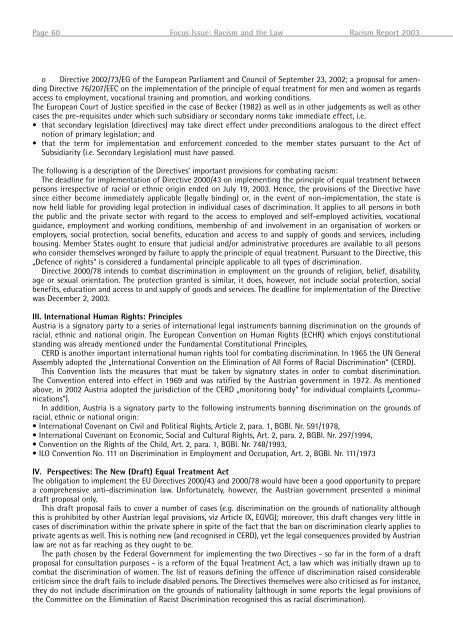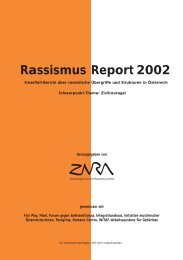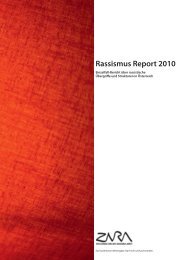Racism Report 2003 - Zara
Racism Report 2003 - Zara
Racism Report 2003 - Zara
Create successful ePaper yourself
Turn your PDF publications into a flip-book with our unique Google optimized e-Paper software.
Page 60 Focus Issue: <strong>Racism</strong> and the Law <strong>Racism</strong> <strong>Report</strong> <strong>2003</strong>o Directive 2002/73/EG of the European Parliament and Council of September 23, 2002; a proposal for amendingDirective 76/207/EEC on the implementation of the principle of equal treatment for men and women as regardsaccess to employment, vocational training and promotion, and working conditions.The European Court of Justice specified in the case of Becker (1982) as well as in other judgements as well as othercases the pre-requisites under which such subsidiary or secondary norms take immediate effect, i.e.• that secondary legislation (directives) may take direct effect under preconditions analogous to the direct effectnotion of primary legislation; and• that the term for implementation and enforcement conceded to the member states pursuant to the Act ofSubsidiarity (i.e. Secondary Legislation) must have passed.The following is a description of the Directives‘ important provisions for combating racism:The deadline for implementation of Directive 2000/43 on implementing the principle of equal treatment betweenpersons irrespective of racial or ethnic origin ended on July 19, <strong>2003</strong>. Hence, the provisions of the Directive havesince either become immediately applicable (legally binding) or, in the event of non-implementation, the state isnow held liable for providing legal protection in individual cases of discrimination. It applies to all persons in boththe public and the private sector with regard to the access to employed and self-employed activities, vocationalguidance, employment and working conditions, membership of and involvement in an organisation of workers oremployers, social protection, social benefits, education and access to and supply of goods and services, includinghousing. Member States ought to ensure that judicial and/or administrative procedures are available to all personswho consider themselves wronged by failure to apply the principle of equal treatment. Pursuant to the Directive, this„Defence of rights“ is considered a fundamental principle applicable to all types of discrimination.Directive 2000/78 intends to combat discrimination in employment on the grounds of religion, belief, disability,age or sexual orientation. The protection granted is similar, it does, however, not include social protection, socialbenefits, education and access to and supply of goods and services. The deadline for implementation of the Directivewas December 2, <strong>2003</strong>.III. International Human Rights: PrinciplesAustria is a signatory party to a series of international legal instruments banning discrimination on the grounds ofracial, ethnic and national origin. The European Convention on Human Rights (ECHR) which enjoys constitutionalstanding was already mentioned under the Fundamental Constitutional Principles.CERD is another important international human rights tool for combating discrimination. In 1965 the UN GeneralAssembly adopted the „International Convention on the Elimination of All Forms of Racial Discrimination“ (CERD).This Convention lists the measures that must be taken by signatory states in order to combat discrimination.The Convention entered into effect in 1969 and was ratified by the Austrian government in 1972. As mentionedabove, in 2002 Austria adopted the jurisdiction of the CERD „monitoring body“ for individual complaints („communications“).In addition, Austria is a signatory party to the following instruments banning discrimination on the grounds ofracial, ethnic or national origin:• International Covenant on Civil and Political Rights, Article 2, para. 1, BGBl. Nr. 591/1978,• International Covenant on Economic, Social and Cultural Rights, Art. 2, para. 2, BGBl. Nr. 297/1994,• Convention on the Rights of the Child, Art. 2, para. 1, BGBl. Nr. 748/1993,• ILO Convention No. 111 on Discrimination in Employment and Occupation, Art. 2, BGBl. Nr. 111/1973IV. Perspectives: The New (Draft) Equal Treatment ActThe obligation to implement the EU Directives 2000/43 and 2000/78 would have been a good opportunity to preparea comprehensive anti-discrimination law. Unfortunately, however, the Austrian government presented a minimaldraft proposal only.This draft proposal fails to cover a number of cases (e.g. discrimination on the grounds of nationality althoughthis is prohibited by other Austrian legal provisions, viz Article IX, EGVG); moreover, this draft changes very little incases of discrimination within the private sphere in spite of the fact that the ban on discrimination clearly applies toprivate agents as well. This is nothing new (and recognised in CERD), yet the legal consequences provided by Austrianlaw are not as far reaching as they ought to be.The path chosen by the Federal Government for implementing the two Directives - so far in the form of a draftproposal for consultation purposes - is a reform of the Equal Treatment Act, a law which was initially drawn up tocombat the discrimination of women. The list of reasons defining the offence of discrimination raised considerablecriticism since the draft fails to include disabled persons. The Directives themselves were also criticised as for instance,they do not include discrimination on the grounds of nationality (although in some reports the legal provisions ofthe Committee on the Elimination of Racist Discrimination recognised this as racial discrimination).
















